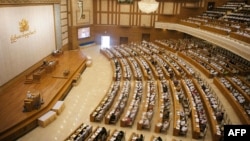Myanmar, also known as Burma, has seen staggering changes over the past few years. State censorship has been relaxed, political prisoners have been released, and foreign investment has poured in. For the country's powerful military, though, much remains the same. As Myanmar prepares for another crucial election in 2015, critics say reforms are dangerously stalled.
Myanmar's once anemic economy has seen staggering change: government controls on the economy have been loosened, with a new banking system, new land policies, and a currency whose value is determined by the market, not the government.
The steps have helped attract an estimated $9 billion in foreign investment since 2011.
But economist Sean Turnell said that although the changes have made the economy more functional, they have done little to change the military's dominant role in both the economy and the political landscape.
"In a movement toward some new government reform after 2015, that issue of the military and its role, will it be the central actor? Will it step back in a meaningful way that really needs to happen? That's the big question," said Turnell.
In particular, the military still controls Myanmar's largest business conglomerates, and most of the country's most lucrative economic sectors, such as natural gas drilling and gemstone mining.
The military's economic influence in Myanmar mirrors its political power. One quarter of seats in parliament are reserved for military appointees, giving it veto power over all constitutional changes.
This has meant little accountability when military forces are accused of rights abuses.
Last month, Harvard's International Human Rights Clinic released a report accusing four top military officials, including current Home Affairs Minister Major General Ko Ko of committing war crimes and crimes against humanity in 2005 and 2006.
Matthew Bugher, Harvard's Global Justice Fellow in Yangon, said there already is enough evidence to issue arrest warrants, but there have been no prosecutions. He said until top military officials are held accountable by a civilian-controlled justice system, the military will continue to act with impunity.
"The military has set their foot down and said they are not willing to address their conduct and they're threatening people who do try to address that," said Bugher. "We think that reformers in the government and opposition politicians who may want to deal with these issues haven't taken a stand to address human rights abuses and address military conduct we also think the military is promoting rights abusers up the chain of command and into primary positions."
Myanmar's opposition, marginalized for decades, has gained seats in parliament, but been unable to upset the military's dominance.
In particular, critics have called out opposition leader Aung San Suu Kyi for failing to push for accountability. Some of her critics believe she has avoided confronting the military in the hopes it will improve her presidential prospects.
For all of the criticism leveled at the military, Myanmar's generals defend their continuing influence by pointing to the country's long-running rebellion by ethnic fighters in some parts of the country. With the military's powerful voice in parliament, Myanmar spends 23.2 percent of its national budget on military spending, the highest in the region, in part to wage war against groups that reject the government's authority. The National Defense and Security Council, effectively governed by the army, sets the budget.
But outside observers say the military's business interests are partly to blame for the ongoing rebellions.
Bugher said the military's economic interest in natural resources located in conflict areas is prolonging the peace process and diminishing trust in the government and military. Last month, government troops shelled a training ground for ethnic minority troops, killing 27 soldiers, just one day after a round of peace talks had ended.
"What we're seeing is that in certain areas of the country where there's extractive industries and natural resources the military's control over government administration is very strong so for example in Hpakant region there's jade mining the military seems to have influence over local government officials and the justice system, and is using those to protect its own interests rather than protect good governance and rule of law," said Bugher.
The Thein Sein government is keen to get the elusive nationwide ceasefire signed ahead of the polls scheduled for late 2015.
It would require a change to Myanmar's constitution to diminish the military's role in government. During a parliamentary debate last month, military representatives made clear their unwillingness to amend the charter ahead of 2015.













